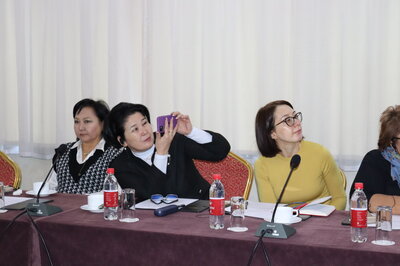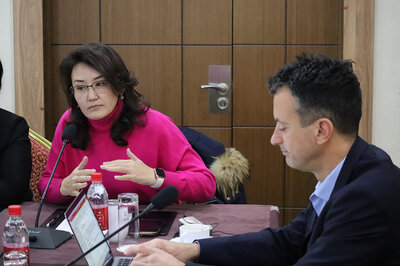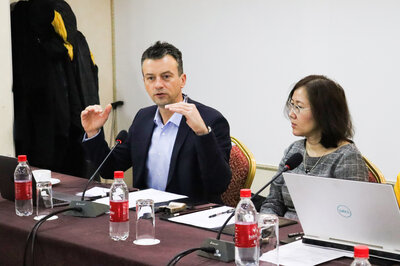Bishkek hosted a discussion of recommendations for improving the policy of inclusive growth in the Kyrgyz Republic.
The Public Service Improvement Project (funded by Swiss Government, implemented by Helvetas and Development Policy Institute) invited an international expert on inclusive growth, ex-director of the Center for Social Policy of the Government of Serbia, Zarko Sunderic, to analyze the climate of inclusive development in Kyrgyzstan and develop recommendations for its improvement.
During his ten-day visit to our country, Zarko Sunderic visited the municipalities of Belovodskoye and Sadovskoye in the Moscow district of the Chui region, met with government officials and experts working in the field of strategic planning and inclusive development, studied the current legislation of the Kyrgyz Republic, as well as reports on the country development and international research in this area.
As a result of the visit, he developed recommendations for the structure and policy of management. These changes will help state and municipal authorities coordinate their work with international partners, the private sector and civil society to implement targeted innovative projects aimed at inclusive growth.
Why is it important to strive for inclusive development? What benefits can it bring to society? What mechanisms should be applied to ensure fair planning and effective implementation of municipal socio-economic development programs?
Attempts to direct the social, political and economic processes in the country towards inclusive development are of great importance for country, especially at this stage. Within the concept of inclusive growth, the focus is on policies that support the poor and socially vulnerable citizens in order to equalize their opportunities for economic growth. Supporting inclusive growth requires parallel action across a range of policies: governance, institutions, access to quality education and health services, fair taxation, targeted social security, gender equality, and anti-discrimination policies. In the long term, such a policy helps to accelerate and maintain the overall economic growth of the country through the active participation of all able-bodied citizens in economic processes; in addition, inclusive development reduces the level of inequality and stratification in society, thereby ensuring social stability.
The concept of inclusive growth has been widely promoted and discussed not only in research circles but also at the policy level, among decision makers, a lot in civil society.
The whole point is that the world is developing, and the countries are developing, which is good and most often we measure it through the growth of GDP. Even though GDP shows a lot, it hides so many things. It might happen in a country where the economy is booming and doing well, but at certain point some populations are not using benefits of the growth.
Inclusive growth means that you pay attention to those who are the poorest, who are without opportunity at this moment, inclusive growth is all about creating opportunities for people who are without power or without money, creating different kind of support services for them.
Inclusive growth is the idea. But there are so many different measures on how you can achieve this. And it depends on country to country and situation. For example, you may have bigger taxes for wealthier people and smaller for poorer people. This is one example of policy how you can do it. The other one is that you pay a lot of attention to employment and education. Inclusive growth cares that everyone has the same opportunity and that public schools are the good quality. You cannot make a mistake with investing in in good education.
Inclusive growth means that you provide different kinds of opportunities for those who are far from the labor market. Often women are not as engaged at the labor market as they could be engaged. Which means that the country is losing enormous development potential.
Human capital development can bring so much good to society. Even within restrictive budgets allow space for human capital development and it will produce good for society.
And currently the PSI Project already has done things on inclusive development, like the employment programs, helping municipalities to better plan. You are trying to work on a different level. And one day, it will come together and encourage each other and create the synergy need. Collecting good examples will create the force that will change the mindset.
The meetings with Zarko Sunderic was attended by representatives of the Ministry of Economy and Commerce, the Ministry of Labor, Social Security and Migration, the State Agency for Civil Service and Local Self-Government, the National Statistical Committee, the Union of Local Self-Government, as well as international donor organizations working in the field of local government and inclusive development in the Kyrgyz Republic.




